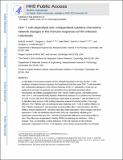CD4+ T cell-dependent and CD4+ T cell-independent cytokine-chemokine network changes in the immune responses of HIV-infected individuals
Author(s)
Lauffenburger, Douglas A; Szeto, Gregory; Alter, Galit; Irvine, Darrell J; Arnold, Kelly B.
DownloadIrvine_CD4 T cell.pdf (1.228Mb)
OPEN_ACCESS_POLICY
Open Access Policy
Creative Commons Attribution-Noncommercial-Share Alike
Terms of use
Metadata
Show full item recordAbstract
A vital defect in the immune systems of HIV-infected individuals is the loss of CD4⁺ T cells, resulting in impaired immune responses. We hypothesized that there were CD4⁺ T cell–dependent and CD4⁺ T cell–independent alterations in the immune responses of HIV-1⁺ individuals. To test this, we analyzed the secretion of cytokines and chemokines from stimulated peripheral blood mononuclear cell (PBMC) populations from HIV+ donors, healthy donors, and healthy donors with CD4⁺ T cells experimentally depleted. Multivariate analyses of 16 cytokines and chemokines at 6 and 72 hours after three stimuli (antibody-coated beads to stimulate T cells and R848 or lipopolysaccharide to stimulate innate immune cells) enabled integrative analysis of secreted profiles. Two major effects in HIV⁺ PBMCs were not reproduced upon depletion of CD4⁺ T cells in healthy PBMCs: (i) HIV⁺ PBMCs maintained T cell–associated secreted profiles after T cell stimulation; (ii) HIV⁺ PBMCs showed impaired interferon-γ (IFN-γ) secretion early after innate stimulation. These changes arose from hyperactive T cells and debilitated natural killer (NK) cell, respectively. Modeling and experiments showed that early IFN-γ secretion predicted later differences in secreted profiles in vitro. This effect was recapitulated in healthy PBMCs by blocking the IFN-γ receptor. Thus, we identified a critical deficiency in NK cell responses of HIV-infected individuals, independent of CD4⁺ T cell depletion, which directs secreted profiles. Our findings illustrate a broad approach for identifying key disease-associated nodes in a multicellular, multivariate signaling network.
Date issued
2015-10Department
Massachusetts Institute of Technology. Department of Biological Engineering; Ragon Institute of MGH, MIT and Harvard; Koch Institute for Integrative Cancer Research at MITJournal
Science Signaling
Publisher
American Association for the Advancement of Science (AAAS)
Citation
Arnold, K. B., G. L. Szeto, G. Alter, D. J. Irvine, and D. A. Lauffenburger. “CD4+ T Cell-Dependent and CD4+ T Cell-Independent Cytokine-Chemokine Network Changes in the Immune Responses of HIV-Infected Individuals.” Science Signaling 8, no. 399 (October 20, 2015): ra104–ra104.
Version: Author's final manuscript
ISSN
1945-0877
1937-9145